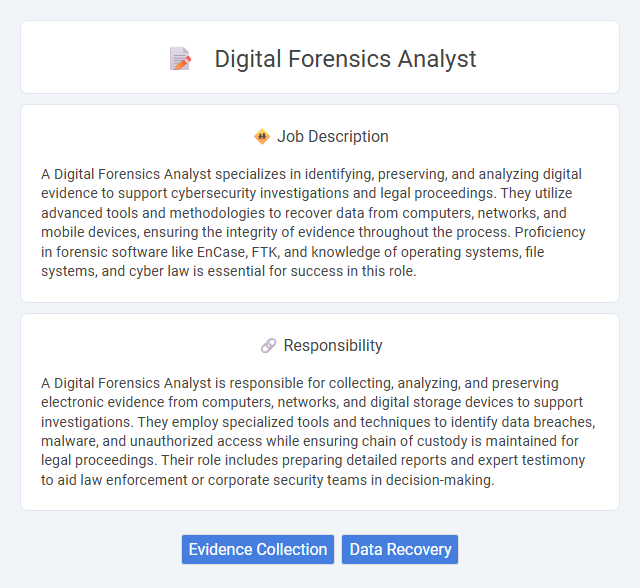
A Digital Forensics Analyst specializes in identifying, preserving, and analyzing digital evidence to support cybersecurity investigations and legal proceedings. They utilize advanced tools and methodologies to recover data from computers, networks, and mobile devices, ensuring the integrity of evidence throughout the process. Proficiency in forensic software like EnCase, FTK, and knowledge of operating systems, file systems, and cyber law is essential for success in this role.
Individuals with a strong analytical mindset and attention to detail are likely to be well-suited for a Digital Forensics Analyst role, as the job often requires meticulous examination of digital evidence. Those who enjoy problem-solving and have a solid understanding of cybersecurity principles may find this career fulfilling. People who prefer routine tasks or lack patience for complex investigations might struggle with the demands of this position.
Qualification
Digital Forensics Analysts typically require a bachelor's degree in computer science, cybersecurity, or a related field, alongside certifications such as Certified Computer Forensics Examiner (CCFE) or GIAC Certified Forensic Analyst (GCFA). Proficiency in forensic tools like EnCase, FTK, and Autopsy, combined with strong knowledge of file systems, operating systems, and network protocols, is essential. Experience in analyzing digital evidence, incident response, and maintaining chain-of-custody protocols ensures the ability to support legal investigations and cybersecurity measures effectively.
Responsibility
A Digital Forensics Analyst is responsible for collecting, analyzing, and preserving electronic evidence from computers, networks, and digital storage devices to support investigations. They employ specialized tools and techniques to identify data breaches, malware, and unauthorized access while ensuring chain of custody is maintained for legal proceedings. Their role includes preparing detailed reports and expert testimony to aid law enforcement or corporate security teams in decision-making.
Benefit
A Digital Forensics Analyst likely enhances organizational security by identifying and mitigating cyber threats through detailed examination of digital evidence. The role probably offers opportunities for continuous skill development given the evolving nature of cybercrime and technology. Professionals in this field may benefit from high demand and competitive salaries due to the critical importance of cybersecurity in various industries.
Challenge
A Digital Forensics Analyst likely faces the challenge of rapidly evolving technology, requiring continuous skill updates to effectively uncover and interpret digital evidence. The role probably demands meticulous attention to detail to accurately trace cyber incidents amidst vast amounts of data. Timely analysis and reporting under pressure may also present significant difficulties in high-stakes investigations.
Career Advancement
Digital Forensics Analysts play a critical role in cybersecurity by investigating cybercrimes and recovering digital evidence, making their expertise highly sought after in law enforcement and corporate sectors. Career advancement often involves gaining certifications such as Certified Computer Examiner (CCE) or GIAC Certified Forensic Analyst (GCFA), which enhance credibility and open opportunities for senior analyst, forensic consultant, or cybersecurity manager roles. Continuous skill development in areas like network forensics, malware analysis, and emerging technologies accelerates progression toward leadership positions within digital forensics and incident response teams.
Key Terms
Evidence Collection
Digital forensics analysts specialize in evidence collection by meticulously preserving digital data from devices such as computers, smartphones, and servers to ensure its integrity for legal proceedings. They employ advanced tools and techniques like write blockers and forensic imaging to capture data without altering the original evidence. Expertise in chain of custody protocols is essential to maintain admissibility and authenticity of digital evidence during investigations.
Data Recovery
Digital Forensics Analysts specialize in data recovery by employing advanced techniques to retrieve corrupted, deleted, or encrypted information from various digital devices. They utilize forensic tools like EnCase, FTK, and Autopsy to extract and preserve data integrity for legal and investigative purposes. Expertise in file system structures, disk imaging, and metadata analysis is crucial for successful data recovery in cybercrime investigations.
 kuljobs.com
kuljobs.com